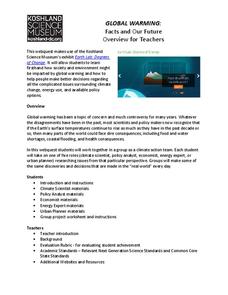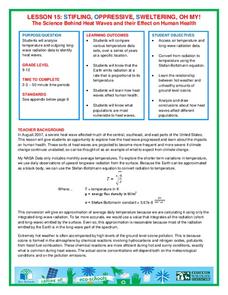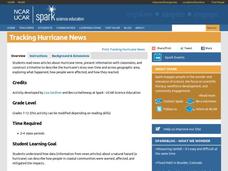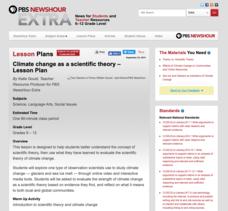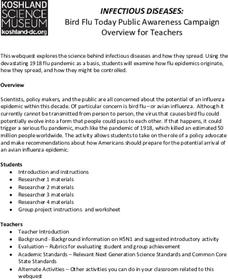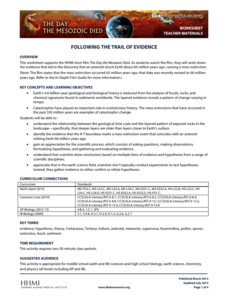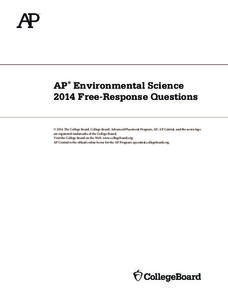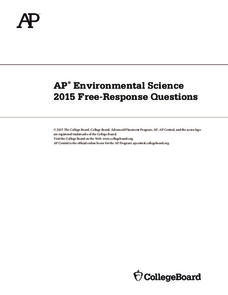Serendip
Photosynthesis Investigation
Can scientists increase the rate of photosynthesis to help clean the air? Scholars complete an experiment determining net photosynthesis. Then, they apply knowledge from the activity to design their own investigations of the factors that...
National Academy of Sciences
Global Warming: Facts and Our Future
According to the United Nations, climate change affects every country on the planet. This research project encourages scholars to explore the factors that affect climate change from different perspectives: climate scientist, policy...
Cornell University
Fibers, Dyes, and the Environment
Nanofibers can be made through electrospinning or force spinning in order to reduce the negative impact on the environment. Pupils study the role of fibers and dye on the environment through a series of five hands-on activities. Then,...
National Wildlife Federation
Stifling, Oppressive, Sweltering, Oh My!
Looking for a hot date? Pick any day in August, statistically the hottest month in the United States. The 15th lesson in the series of 21 instructs pupils to investigate the August 2007 heat wave through NASA data, daily temperature...
NASA
Dark Matter NASA Conference
Young scholars calculate the escape velocity of planets in our solar system and use that knowledge to calculate the escape velocity for NGC 2300 group. They then suggest reasons for the escape velocity to be higher than possible given...
NASA
Two Versions of Gravity: Newton and Einstein
We have all heard the debate about teaching both theories, but an innovative lesson plan takes the discussion to a new level. Scholars research and debate Newton's Law of Gravitation versus Einstein's General Theory of Relativity with...
Howard Hughes Medical Institute
The Making of the Fittest: Got Lactase? The Co-evolution of Genes and Culture
Got milk? Only two cultures have had it long enough to develop the tolerance of lactose as an adult. Learn how the responsible genes evolved along with the cultures that have been consuming milk. This rich film is supplied with a few...
Howard Hughes Medical Institute
How Novel Icefish Genes Can Improve Human Health
Designed to accompany the 13-minute video The Making of the Fittest: The Birth and Death of Genes, this handout serves as both a viewing guide during the video and an analysis of how the adaptations of the icefish might help treat some...
Center Science Education
Tracking Hurricane News
Here is a unique twist for your lesson plan on hurricanes. After examining extreme weather news headlines, your storm chasers view a PowerPoint about hurricanes and then zoom in on Hurricane Irene. They map a timeline of her trek up the...
PBS
Climate Change as a Scientific Theory
Get your class thinking about climate change as a scientific theory. Guided by a handout, emerging earth scientists read articles and take notes about glaciers and sea ice. To conclude, they write an evaluation of the evidence for...
Bonneville
Solar Pathfinder Tutorial
Find the right path to learn about solar energy. Scholars set up and use Solar Pathfinders to take measurements related to solar insolation at a particular site. Based on the data, they estimate the solar potential in kWh/m^2/day of a...
Bonneville
Photovoltaic Solutions "Shark-Tank Style"
Come up with a great idea and change the world for the better. Working in groups of three, learners apply their knowledge of photovoltaic systems to design a battery-powered electric vehicle capable of replacing gas-powered cars. They...
Bonneville
Designing a Solar Charger
The sun can even charge batteries. The fourth of five lessons in the Solar Transportation unit has pupils design a charger that uses solar modules to charge a 12-volt lead-acid battery. They estimate the charge that accumulates and...
Bonneville
Can Portable PV Charge Vehicles?
Take charge of learning about electric vehicles. Instructors first provide the class with information about PV modules and batteries. Learners then conduct an experiment where they connect PV modules in series and in parallel to...
Children’s Hospital of Philadelphia
Vaccine Safety
Enter the debate on vaccines. Small groups research topics related to vaccine safety in the last lesson in a unit of five. In the process of the research, team members learn how to determine the validity and credibility of a website. The...
Teach Engineering
Investigating the Properties of Plastic and its Effects on the Environment
Pore over the properties of plastic. Working through four different stations, pupils investigate some properties of plastic, including chemical decomposition, mechanical breakdown, density, and the ability to infiltrate the food chain....
Koshland Science Museum
Infectious Disease: Evolving Challenges to Human Health High School Virtual Field Trip
Understanding the science of the spread of infectious diseases is the first step in controlling them. Learners begin by researching the factors that affect the contraction and spread of these diseases and the challenges communities face...
National Academy of Sciences
Lights at Night Webquest
Help learners find ways to become more efficient energy consumers. To start, individuals research how different countries address energy efficiency and then analyze their own carbon footprint. They use their research to identify ways to...
National Academy of Sciences
Infectious Diseases: Bird Flu Today
Understanding how viruses spread has never been more important. A well-designed WebQuest lesson has young scientists research viruses, how they spread, and how they are treated. They also consider the trends in common viruses in the world.
Howard Hughes Medical Institute
Following the Trail of Evidence
One important skill in analyzing scientific evidence is identifying facts versus opinions. Scholars identify pieces of evidence from the film The Day the Mesozoic Died and then discuss this evidence in small groups at the end of each act...
College Board
2014 AP® Environmental Science Free-Response Questions
Less than half of AP Environmental Science test takers pass each year. The College Board releases previous test questions covering topics from greenhouse gases to ecological succession to help scholars prepare for future assessments. Use...
College Board
2015 AP® Environmental Science Free-Response Questions
Less than eight percent of AP Environmental Science test takers earn the highest score possible. Help scholars improve their scores by using actual test questions on water quality and urban planning before reading sample responses that...
College Board
2016 AP® Environmental Science Free-Response Questions
The average student scores less than three points, out of five, on the AP Environmental Science test. Most do well on the multiple choice and struggle with the free-response section. Encourage extra free-response practice with actual...
College Board
2017 AP® Environmental Science Free-Response Questions
Almost half of test takers passed the AP Environmental Science exam in 2017. Use the free-response questions on the topics of pollution and ecosystems to improve writing skills in preparation for the AP exam. Discuss the scoring...



